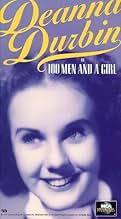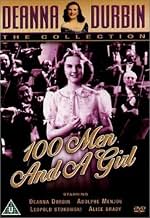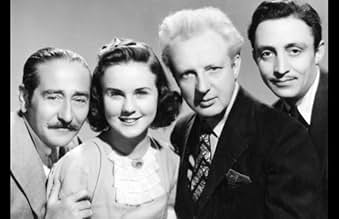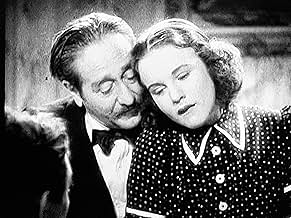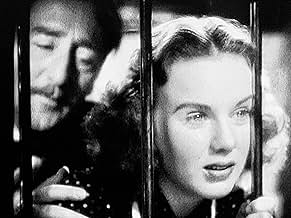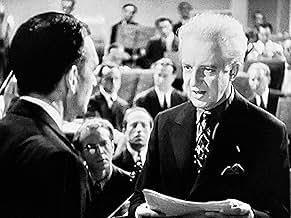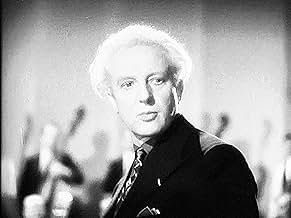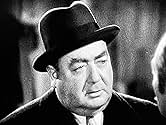Ajouter une intrigue dans votre langueThe daughter of a struggling musician forms a symphony orchestra made up of his unemployed friends and through persistence, charm and a few misunderstandings, is able to get Leopold Stokowsk... Tout lireThe daughter of a struggling musician forms a symphony orchestra made up of his unemployed friends and through persistence, charm and a few misunderstandings, is able to get Leopold Stokowski to lead them in a concert that leads to a radio contract.The daughter of a struggling musician forms a symphony orchestra made up of his unemployed friends and through persistence, charm and a few misunderstandings, is able to get Leopold Stokowski to lead them in a concert that leads to a radio contract.
- Réalisation
- Scénario
- Casting principal
- Récompensé par 1 Oscar
- 4 victoires et 4 nominations au total
- Stage Doorman
- (as Jack Smart)
- Party Guest at Mrs. Frost's
- (non crédité)
- Adams -- Stokowski's Butler
- (non crédité)
Avis à la une
Ms. Durbin was a cute young girl in those years. She was wonderful in the way she projected charm without being obnoxious, or bratty. Her singing voice was amazing and it was always prominently heard in all the movies she made.
The story is something typical of those years. Director Harry Koster was able to present the material in a good fashion. The film follows Ms. Durbin in her quest to help her impoverished father and his musician friends. With the help of the rich Frosts, she is able to bring together the talented unemployed music men into forming an orchestra and convincing the great Leopold Stokowski to make music with them.
The film will not disappoint Ms. Durbin's fans. Adolph Menjou plays her father. The wonderful Alice Brady and Eugene Palette are seen as the generous Frosts, and Mischa Auer plays the family friend Michael.
It was interesting to read the "Wizard of Oz" comparisons on this page, because Deanna Durbin reminds me of Judy Garland in a way - in this era, they both wore their hair the same way, were both teenagers, and both had mature voices, Durbin of course leaning more toward the classical. To say that Durbin is an energetic actress is an understatement. She's completely hyper, and that high speaking voice only adds to the anxiety level. As Patsy, she is very pretty and sings well. Like all sopranos of that era, she backs off of her high notes, but the middle voice is quite beautiful and as she grows into a young woman, it will become even more so. She does a credible job on Mozart's "Alleluia" and "Libiamo" from "La Traviata" despite some pitch problems. Given her age, these are minor criticisms. She has a great deal of poise, too, for someone so young.
The rest of the cast is very good, and Stokowski makes a nice contrast against Durbin as his calm, deliberate and very professional self.
"100 Men and a Girl" is about a determined young woman with an outlandish dream who makes it come true. This isn't a fantasy like "Wizard of Oz," nor is it very realistic, I suppose, but the way it's presented - well, you just believe it could happen.
Set in New York City, John Caldwell (Adolphe Menjou), is seen as an unemployed musician who makes a desperate attempt confronting conductor Leopold Stokowski at Carnegie Hall for a job, but is consistently chased about by stage doorman, Marshall (J. Scott Smart), with pleas ignored by Stokowski's manager, Mr. Russell (Jameson Thomas). After being shown out the door, Caldwell acquires a lost purse on the crowded street with cash inside. Unable to locate its owner, he returns home where he uses the found money to pay off his back room rent, giving his teenage daughter, Patricia (Deanna Durbin) a indication that he's now working under Stokowski with advance in salary. In due time, however, Patricia, learning the truth, locates the identification inside the purse and does the right thing by returning it to Mrs. Frost (Alice Brady) at her luxurious home. Telling her and society guests about her father's orchestra, Mrs. Frost agrees to have her husband, John R. Frost (Eugene Palette), sponsor them on his radio program. As Caldwell organizes his orchestra in the garage, Patricia comes to the Frost home to follow up on her promise only to find that the absent-minded Mrs. Frost has gone to Europe. After locating Mr. Frost's whereabouts, she asks him for financial support, but dismisses the girl and her story as one of many practical jokes by his friend, Tommy Bitters'(Jed Prouty). With unexpected results, news reaches the media of Stokowski conducting for Caldwell's unemployed musicians, causing complications for all concerned, considering Stokowski is going on a six month concert tour in Europe.
A delightful Depression era/ fairy tale type story helped by the presence of Deanna Durbin's self confidence and energetic personality. It's hard to believe how virtually new she is to the movie business and natural she is as a performer. It's not so easy to forget Durbin's blink of her eyes that bring a happy smile to her sad-faced father (Menjou). Aside from its original screenplay by Bruce Manning, Charles Kenyon and James Mallhauser, the film is highlighted by a mix of contemporary and classic music, including "Symphony # 5, 4th Movement" by Peter Ilyich Tchiakowsky (conducted by Leopold Stokowski); "It's Raining Sunbeams" by Frederick Hollander and Sam Coslow (sung by Deanna Durbin); "The Rakoczy March" by Bezloiz; "A Heart That's Free" by Alfred G. Robyn and Thoms T. Railey; "Prelude to Act II" from Richard Wagner's "Loitengrin"); Mozart's "Allelua in 'F' Major" "Second Hungarian Rhapsody" by Franz Liszt; and "Libiamo Ne Liete Lauci" from Guiseppi Verdi's "La Traviata" (sung by Durbin). With these classical pieces, good production values and high notes, 100 MEN AND A GIRL gives the distinction of looking more like an MGM product than Universal's.
The supporting cast includes such Hollywood reliables as Mischa Auer (Michael Borodoff, a musician and close friend of the Caldwells); Billy Gilbert (The Garage Owner); Frank Jenks (The Taxi Driver); Edwin Maxwell (Ira Westling); with John Hamilton, Jack Mulhall and Charles Coleman in smaller roles. The performance given by Leopold Stokowski may provoke laughter to contemporary viewers for his wavy combed back hairstyle and mechanical way of conducting his orchestra with the use of his hands instead of a baton.
ONE HUNDRED MEN AND A GIRL earned an Academy Award nominee for Best Picture of 1937. After frequent public television revivals that took place in the 1980s, this now Durbin classic got further recognition on home video around 1994. In 1996, it had occasional revivals on American Movie Classics, and later on Turner Classic Movies where it premiered February 20, 2006. If movie does not prove satisfactory with its story, then it should for classical music lovers. (****)
Le saviez-vous
- AnecdotesLeopold Stokowski recorded the classical music in the film at the Philadelphia Academy of Music, using the Philadelphia Orchestra (of which he was still principal guest conductor), on a multi-channel sound system, the first time one was ever used to record music in a film. The musicians seen in the film, however, were L.A.-based players doing what was called "sideline" (seen but not heard, merely miming to a prerecorded soundtrack played by others).
- GaffesThe position of Patsy's hands when she's crying on the bed.
- Citations
Leopold Stokowski: [Patsy has come to apologize for telling a newspaper that Stokowski would be conducting her orchestra of jobless musicians] But why did you do it? You must have had a reason.
Patricia "Patsy" Cardwell: Oh, yes! I had a hundred reasons! Would you like to hear them?
Leopold Stokowski: I certainly would.
Patricia "Patsy" Cardwell: [Goes to the door of his study and counts:] One! Two! Three! Four!
[And Stokowski suddenly hears "Hungarian Rhapsody" as clear as a bell inside his own house! He and she go out onto his balcony overlooking the entryway. The 100 men are standing on the stairway, playing]
Patricia "Patsy" Cardwell: Those are my reasons. I thought you'd like to hear them.
[Stokowski listens until the piece is nearly over, and then starts conducting with his hands]
- ConnexionsFeatured in NET Festival: Leopold Stokowski (1970)
- Bandes originalesSymphony No. 5 in E minor: Fourth Movement
(1888)
Music by Pyotr Ilyich Tchaikovsky (as Tschaikowsky)
Played by a symphony orchestra conducted by Leopold Stokowski
Meilleurs choix
- How long is One Hundred Men and a Girl?Alimenté par Alexa
Détails
- Date de sortie
- Pays d’origine
- Langue
- Aussi connu sous le nom de
- One Hundred Men and a Girl
- Lieux de tournage
- Société de production
- Voir plus de crédits d'entreprise sur IMDbPro
Box-office
- Budget
- 762 000 $US (estimé)
- Durée
- 1h 24min(84 min)
- Couleur
- Rapport de forme
- 1.37 : 1

